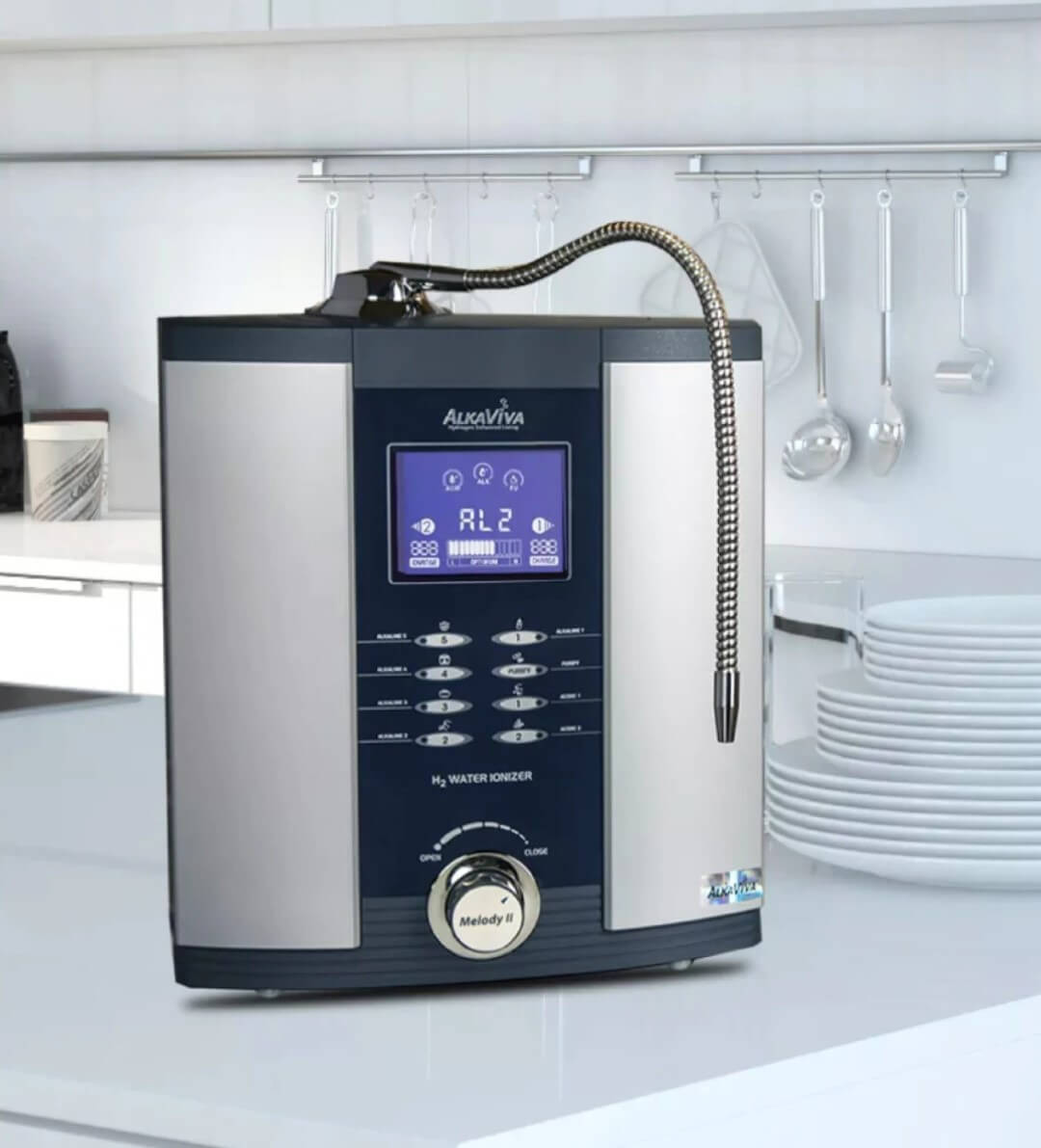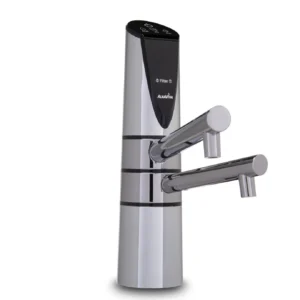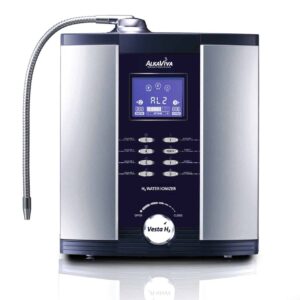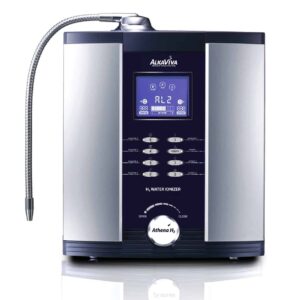How to choose a water ionizer.
Do you want to enjoy the benefits of alkaline and ionized water but find it difficult to decide which model to choose?
Below we have prepared a small guide for you to help you make the decision.
5 Important criteria when purchasing an ionizer:
1. The best filtration
Ionizers are designed to give you two things: pure and healthy water. First of all, healthy water should be free of contaminants.
Your ionizer connects to the water network and filters the water before ionizing it. Even if the mains water is filtered and treated, it is not completely free of contaminants such as chlorine, arsenic, lead, other heavy metals, volatile organic compounds, pharmaceuticals, etc. That’s why high-performance filtering is critical to you.
Although all ionizers use a filter to purify water, not all filters are equally effective. Most ionizer filters available on the market have between three and five filtration stages and use only granulated activated carbon together with calcium in various forms.
If you care about your health and the health of your family, you want to drink water that is as pure as possible, with as few contaminants as possible. Before buying an ionizer, always check how well it filters the water before ionizing it. You don’t just want alkaline and ionized water, you want pure, alkaline and ionized water.
2. The most advanced technology
An ionizer is a long-term investment for your health and that of your family. It is important that your ionizer produces alkaline and ionized water with the highest possible ORP parameters (negative ionization as high as possible) and infused Hydrogen concentration as high as possible, at optimal pH values (pH between 8.5 – 10).
The performance of the ionizer depends on:
Electrode quality
Electrodes are for the ionizer what is the heart for our body. We drink alkaline and ionized water for the benefits it brings to our health. Electrodes cause ionization which gives us these benefits.
What matters to the electrodes is their efficiency, ie the level of pH, ORP and Hydrogen they produce. It doesn’t matter the number of electrodes or their size. It matters how advanced the electrodes are and what ionization parameters they are able to produce.
You will find a lot of exaggerated information on the internet about more electrodes and more power (more current applied to the electrodes). Some companies claim that higher electrodes mean higher performance, which makes no sense. As technology advances, it gets smaller and stronger, not bigger!
In reality, ionizers that need to apply more power to the electrodes actually use outdated or inefficient technology. More power applied to the electrodes produces more heat and demands more of the platinum layer on them, which can lead to their faster degradation, and, ultimately, to poorer ionizer performance over time.
Rather than choosing an ionizer just because you were told it has the largest electrodes, find out what ionization performance that ionizer has, and what power it consumes. The better the ionizer performs and consumes less power, the more advanced and efficient electrodes it has. The more power it needs to achieve good ionization performance, the less efficient it is.
Always, the most relevant are the performance tests performed in independent laboratories. If you can find such a comparison, it is the best source of information for you. But don’t confuse any presentation you find on the internet, made by a representative of a company selling ionizers, with a test done in an independent laboratory.
3. Maximum performance with a minimum of maintenance operations
A quality water ionizer is an important investment, so you need to consider something in addition to its performance: how to maintain its performance over time and how many maintenance operations you will have to do for it.
As you saw above, the less power an ionizer puts on the electrodes, the longer the electrodes will last. But the most important aspect that influences the performance of the ionizer over time is the performance of the ionizer self-cleaning system, which we talk about below.
Self-cleaning system
Alkaline and ionized water has major benefits that occur due to ionization. However, the ability of the ionizer to change water in this way may decrease over time.
Electrodes are the component of the ionizer that changes water qualities. Water contains minerals. Minerals are deposited on electrodes by their repeated exposure to water, so that mineral deposits gradually cover the electrodes. A mineral-coated electrode has a limited ability to transform water efficiently, which leads to a decrease in water quality and a decrease in its benefits.
To prevent mineral deposits on the electrodes, ionizers have self-cleaning systems.
All ionizers have self-cleaning systems, but not all systems are equally efficient. Before buying an ionizer it is essential to understand the type of cleaning cycle it uses. In fact, it is one of the most important considerations because it determines the long-term performance of your ionizer.
In addition to maintaining the long-term performance of the ionizer, the self-cleaning system depends on how often you have to manually clean the ionizer, or send it to the service for cleaning. Any ionizer needs maintenance, but some ionizers need much more frequent maintenance than others. It is good to know from the beginning how much time, effort, and possibly money will cost you to maintain the ionizer. And that depends on the type of self-cleaning system that the ionizer has.
If you want an ionizer that will maintain its performance for as long as possible, with a minimum of maintenance operations on your part, choose one that has a self-cleaning system that is as efficient as possible. The most commonly used such systems are briefly explained below.
There are three types of self-cleaning systems.
Automatic system for periodic cleaning of electrodes
This system monitors the use of the ionizer and triggers periodic cleaning of the electrodes at certain periods of time or after a certain number of liters of water processed by the device. During the cleaning period, the ionizer stops for 20-30 seconds to clean the electrodes.
It is the least efficient system. It’s like doing a short cleaning after using the kitchen 15-30 times.
Appliances with such self-cleaning systems need manual cleaning much more often than models with more advanced systems. Some manufacturers recommend manual cleaning of these models once a month.
Motor Automatic Reverse Cleaning System (MARC)
Some ionizer models have a reversible ionization chamber that allows automatic adjustment of the water flow so that you can enjoy alkaline water even when your ionizer is cleaning. This means that the ionizer will never stop for cleaning, as cleaning is done while the ionizer is running.
DARC (Double Automatic Reverse Cleaning System)
This system is the most advanced. It almost completely removes mineral deposits from the electrodes, increasing the life of your ionizer. You never have to wait for a cleaning cycle to complete before you can drink water.
The revolutionary new patented DARC self-cleaning system eliminates mineral deposits from the electrodes – protecting your investment and providing you with many years of healthy water from your ionizer. This cleaning system is 100% efficient.
The DARC system continuously cleans the electrodes throughout the operation of the ionizer, each time you use it. This is done by changing the polarity every 20 seconds. So if you use the ionizer for 40 seconds it will work for 20 seconds with a polarity and then the next 20 seconds will change the polarity of the electrodes. You will never have to wait or think about a cleaning cycle.
Of the three systems above, the most efficient is the DARC system, followed by the MARC system and finally the periodic cleaning system.
Always choose the ionizer with the best self-cleaning system. You will be sure to drink water with the same pH and ORP parameters as at the beginning, and you will only have to clean the appliance by hand very rarely, on average every 1 year.
4. Credible certifications and documentation
Always research what the information you receive about a water ionizer is based on. It is just marketing information, or there are credible documents, such as manufacturer’s certifications or tests in independent laboratories that confirm either the quality of the filtration or the ionization performance.
5. A strong company and a solid guarantee behind the product
Your health and well-being are the essential considerations when choosing a water ionizer. The manufacturer behind that ionizer is also very important. Find out everything you can about the history, experience and know-how of the manufacturer.
The stronger the manufacturer, the more you can guarantee that it will be on the market in a few years. It is not uncommon for some new companies in the market not to last more than a few years. You don’t want to run out of supplies or service after making such an important investment.
See what guarantee the ionizer you buy has. An extended warranty shows you that the ionizers are reliable and do not break down over time and give you the peace of mind that whenever you have a problem, it will be solved.
If you’ve read this far, I’m sure you want to buy an ionizer. You now have the necessary information based on which you can choose the most suitable ionizer for you and your family. Use them, research carefully and you will make the best investment.
Are you ready to move on? Find out how Alkaviva ionizers meet all the important criteria above in the article Why buy an Alkaviva ionizer.







